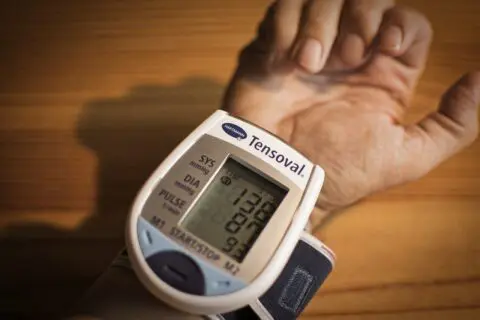High blood pressure (Hypertension) means having a baseline blood pressure above 140/90. Many people live for years with hypertension without knowing it, but there can be serious complications. In short, when someone has hypertension, lowering blood pressure should become the number one priority.
Here are the complications of hypertension.
7 Complications of Hypertension
- Heart Disease: When the heart has to struggle to pump, it can lead to congestive heart failure, a potentially fatal condition. Angina, or chest pain, can occur when the heart does not get enough oxygen.
- Stroke: High blood pressure can cause balloon-like outpouchings in arteries in the brain, known as aneurysms. When these aneurysms burst, a stroke can occur, causing crippling effects or even death.
- Kidney Failure: Many blood vessels carry blood through the kidneys to have toxins removed. Excessive pressure can damage these vessels and impair kidney function.
- Sexual Dysfunction: High blood pressure can cause low libido in women and erectile dysfunction in men.
- Peripheral Artery Disease: This can lead to pain, cramping, and tiredness in the limbs.
- Poor Vision: Damage to blood vessels in the eyes and swelling of the optic nerve can result in vision problems.
- Hypertensive Crisis: This is a medical emergency caused by extremely high blood pressure.
Hypertension Prevention–Making Healthy Lifestyle Choices
- Maintain Normal Weight: Keeping a healthy weight can reduce the risk of hypertension.
- Eat a Healthy Diet: Incorporate lots of fruits and vegetables, nuts, beans, and whole grains into your diet.
- Perform Physical Activity Daily: Regular exercise helps maintain healthy blood pressure levels.
- Avoid Smoking and Excess Alcohol: Both can contribute to high blood pressure.
9 Types of Hypertension Medications
If you have hypertension, you need to treat it ASAP. Here’s how.
- Diuretics: Increase urination, lowering pressure by reducing the amount of fluid in blood vessels.
- Examples: spironolactone (Aldactone), hydrochlorothiazide (Hydrodiuril, Microzide), furosemide (Lasix)
- Beta Blockers: Relax and slow down the heart and dilate blood vessels.
- Examples: atenolol (Tenormin), bisoprolol (Zebeta), metoprolol, nadolol, propranolol (Inderal)
- Calcium Channel Blockers: Relax the heart and blood vessels.
- Examples: amlodipine (Norvasc, Lotrel), diltiazem (Cardizem CD, Cardizem SR, Dilacor XR, Tiazac), felodipine, nicardipine, nifedipine, nisoldipine, verapamil
- ACE Inhibitors: Block blood pressure-raising enzymes produced by the kidneys.
- Examples: captopril, enalapril, lisinopril, ramipril
- Angiotensin II Receptor Blockers: Help keep arteries open.
- Examples: candesartan (Atacand), eprosartan (Teveten), irbesartan (Avapro), losartan (Cozaar), telmisartan (Micardis), valsartan (Diovan)
- Alpha Blockers: Relax muscle tone of blood vessels.
- Examples: doxazosin (Cardura), prazosin (Minipress), terazosin (Hytrin)
- Central Agonists: Lower blood vessels’ ability to contract.
- Peripheral Adrenergic Inhibitors: Reduce blood vessel contraction.
- Blood Vessel Dilators: Relax blood vessels.
Hypertension Basics: Final Thoughts
Hypertension is a serious condition that, if left untreated, can lead to severe health complications affecting the heart, brain, kidneys, and overall quality of life. Making healthy lifestyle choices like maintaining a normal weight, eating a balanced diet, exercising regularly, and avoiding smoking and excessive alcohol can significantly reduce the risk.
For those who need medication, there are numerous options available to manage high blood pressure effectively.
QuickMD can prescribe the appropriate medications to you, and our doctors are experts in treating hypertension. Create an account and talk to a doctor immediately.




